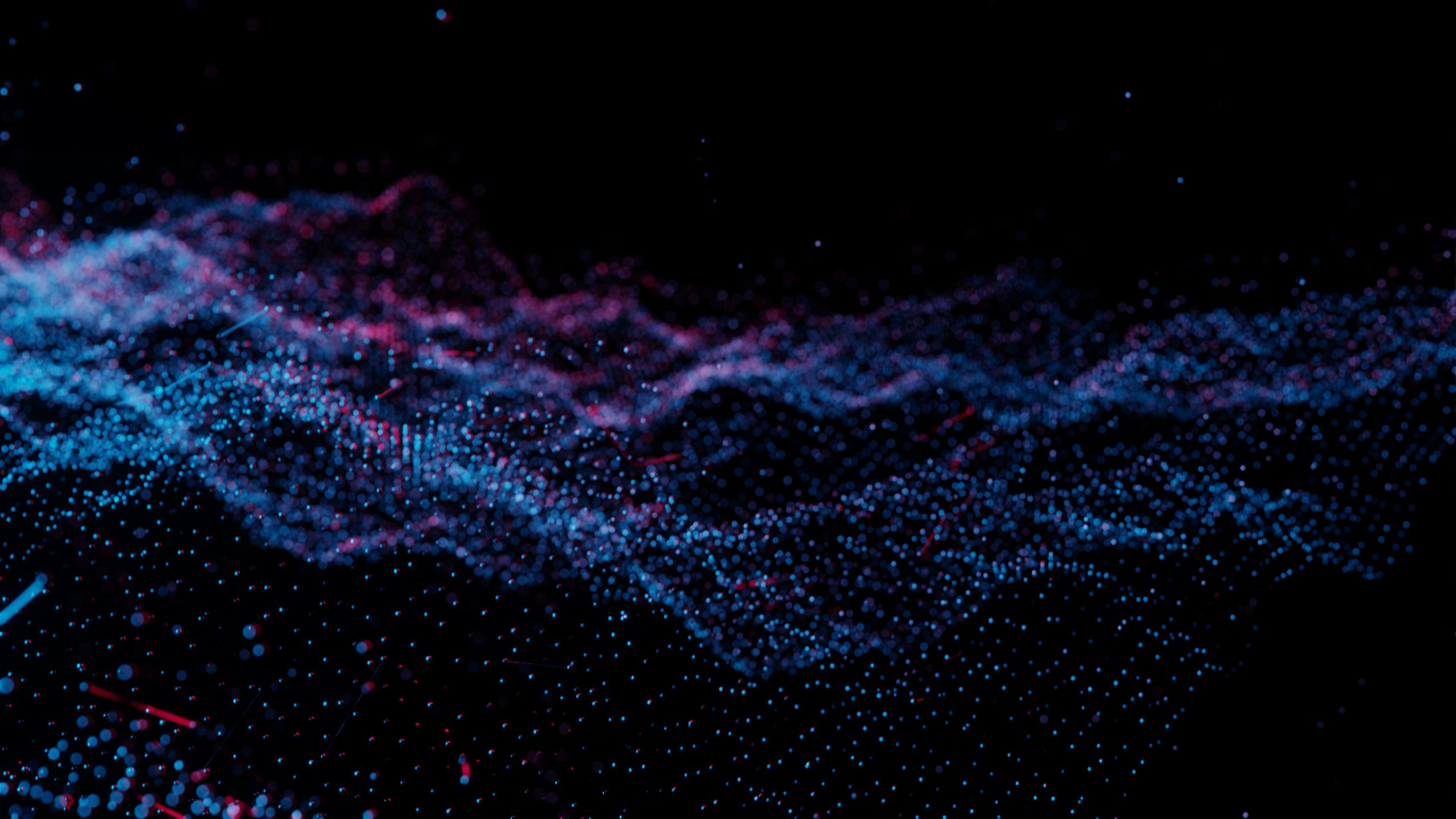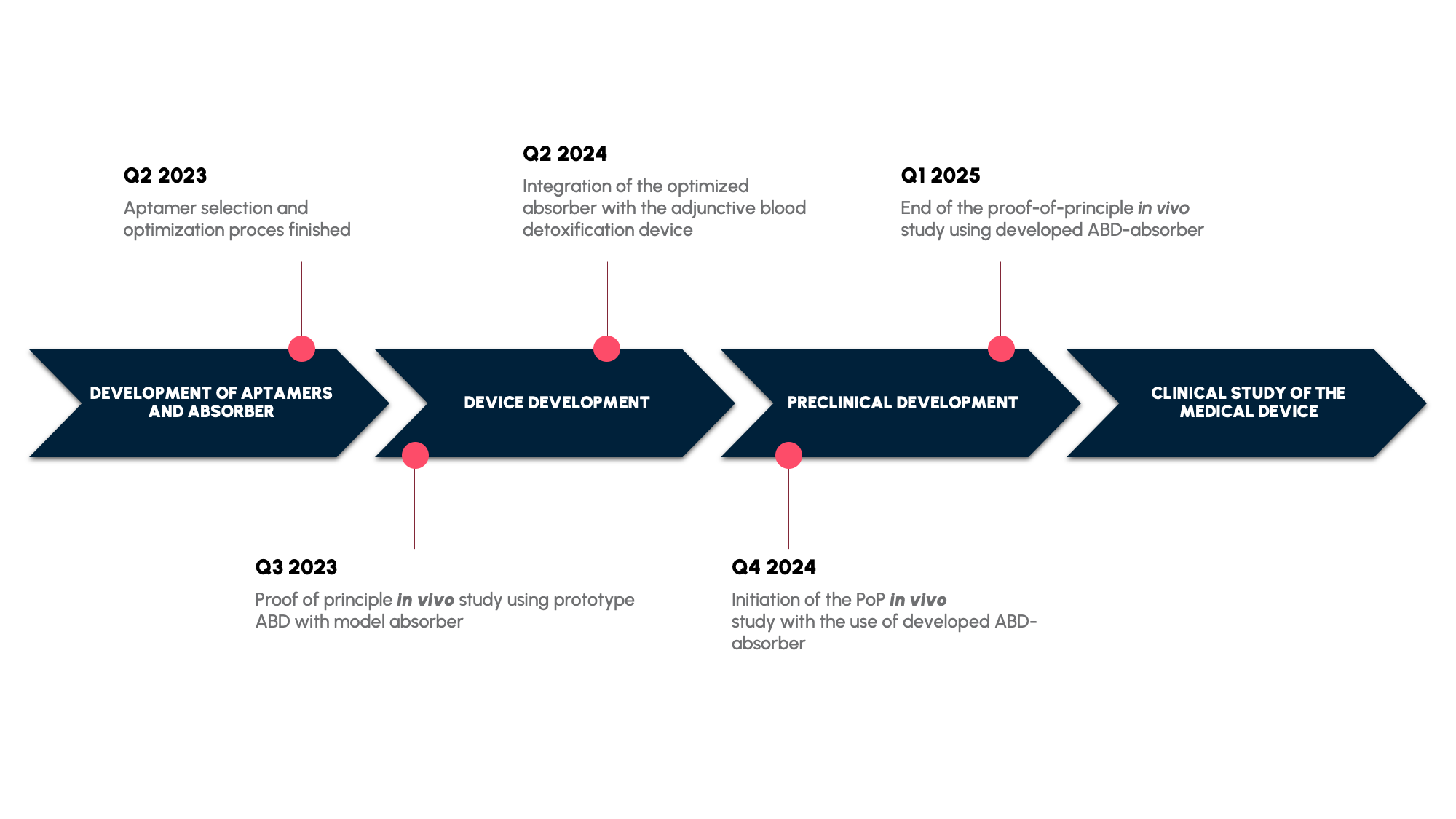
R&D portfolio

Within our portfolio, we are developing an aptamer-based medical device called ABD (for Adjunctive Blood Detoxification), designed to be an add-on to currently available kidney replacement machines, in order to safely and specifically remove toxins from CKD patients’ blood. We focus on achieving a therapeutic effect by restoring water homeostasis, reducing proinflammatory cytokines, and reducing negative cardiovascular effects of kidney failure in patients.
Within our portfolio, we are developing an aptamer-based medical device called ABD (for Adjunctive Blood Detoxification), designed to be an add-on to currently available kidney replacement machines, in order to safely and specifically remove toxins from CKD patients’ blood. We focus on achieving a therapeutic effect by restoring water homeostasis, reducing proinflammatory cytokines, and reducing negative cardiovascular effects of kidney failure in patients.
Kidney dialysisis a life-saving treatment, but it comes with an enormous socio-economic burden, for both patients and society.
Chronic Kidney Disease (CKD) is caused by a progressive and irreversible loss of kidney function, leading to an accumulation of life-threatening toxins – normally cleared by the kidneys – in the body.
Kidney dialysis is a life-saving treatment that, comes with an enormous socio-economic burden, for both patients and society. Worldwide, around 3 million patients with end-stage CKD undergo kidney dialysis treatment to substitute for loss of kidney function.
However, hemodialysis treatments can only partially remove toxins from blood, and patients suffer from many symptoms. Serious complications are also common, including anemia, gout, hyperparathyroidism, and various bone disorders. These comorbidities not only affect a patient’s quality of life, but also represent an economic burden to society, as the average cost of kidney dialysis CKD patients raises the cost of monthly care close to USD 14.4k on average. Almost 50% of patients older than 60 years of age who are candidates for kidney transplantation in the United States, the only treatment that can ‘cure’ a patient from CKD, die while on the waiting list before receiving a renal graft, often due to cardiovascular complications and events. Another important medical need in CKD patients, not addressed by kidney dialysis, is failing water management in the body when the kidneys stop functioning. Failure to produce urine causes the quality of life of CKD patients to plummet. The relation between toxins in the blood and those symptoms is clear, yet poorly addressed in current kidney dialysis. Hence, there is an unmet medical need for treatments that address these particular aspects in hemodialysis patients. Doto Medical is developing its ABD device with aptamer-based adsorbers to tackle these challenges with a portfolio of tailored projects permitting dialysis technology to enter a new era of targeted therapies.


CKD patients receiving dialysis treatment have a 9- to 12-fold increased risk for mortality compared to the general population.
Almost 50% of patients older than 60 years of age who are candidates for kidney transplantation in the United States, the only treatment that can ‘cure’ a patient from CKD, die while on the waiting list before receiving a renal graft.
PB103a
Chronic inflammation is underlying kidney deterioration. Therapeutic strategies that inhibit chronic inflammation, for instance by blocking the activity of pro-inflammatory cytokines prolong kidney activity in experimental animal models. Therapies that target such molecules exist, for instance in the form of Humira and Actemra, but are not approved for CKD patients. A major drawback of such therapies is that a single injection will immune-compromise patients for weeks, which will make this patient group especially vulnerable to infections such as COVID and influenza.
Another major hurdle is cost, as these antibody therapies can cost thousands of USD per month. To address this medical need, Doto Medical will develop an adsorber to be used with the ABD device as an add-on to current kidney dialysis therapy, which can safely remove proinflammatory cytokines from the blood of CKD patients. The goal of the PB103a is to markedly prolong residual kidney activity in CKD patients to maintain water homeostasis, without immune-compromising patients. The reduction in health care cost for treatment of comorbidities will allow the PB103a medical device to be cost-efficient from a treatment perspective.
PB103b
Cardiovascular disease (CVD), including heart-failure, accounts for approximately 50% of the deaths in patients undergoing dialysis. Some blood proteins are clearly upregulated in CKD patients with CVD and appear to play a direct role in blood-vessel deterioration. These are not removed in current kidney dialysis and thus can propagate CVD. To address this unmet medical need, Doto Medical is developing a medical device, as an add-on to current kidney dialysis, that can safely remove such proteins from the blood of CKD patients using an aptamer-based adsorber which captures and removes specific molecular targets from the patient’s blood. The goal of the PB103b is to markedly decrease mortality due to CVD in CDK patients, and to reduce the cost of CVD treatment to society.
PB103c
Although hemodialysis is lifesaving, the treatment itself affects the body, and contributes to disease. Of special concern is the silicone tubing used to transport blood from the body through the filtration device. Although largely inert, blood reacts to the tubing in the form of blood-coagulation and complement activation. Both processes are natural reactions of our body to injury. A consequence of these processes is that they stimulate inflammation, and thus contribute to several comorbidities in CKD patients, including kidney deterioration and cardiovascular disease. One of proteins present in blood plays a key role in this process. This protein is not removed in current kidney dialysis and thus can propagate inflammation uninhibited. To address this unmet medical need, Doto Medical will develop an adsorber to be used with the ABD device as an add-on to current kidney dialysis therapy, that can safely remove this protein from the blood of CKD patients. The goal of the PB103c is to markedly decrease comorbidities in CDK patients by inhibiting hemodialysis-induced inflammation.
